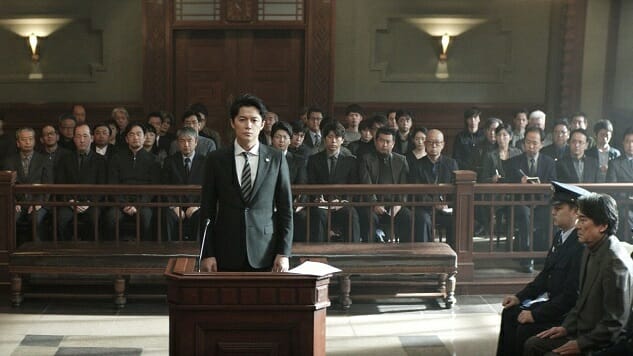The Third Murder

Don’t think of Hirokazu Kore-eda’s The Third Murder as a legal thriller or a courtroom drama. You’re better off approaching it like an ethics lecture. Not that the film is disinterested in legal matters or courtroom conflicts, per se, but little actually happens over its two-hour runtime. It’s more concerned with philosophy than theatrics. From the other side of the camera, you can sense Kore-eda’s resolve to avoid making a straightforward, plot-driven narrative where crime is committed, law is exercised, and justice is served.
Here, the division between right and wrong is as difficult to discern as the plexiglass separating defense attorney Shigemori (Masaharu Fukuyama) from Misumi (Koji Yakusho) in their attorney-client conversations. Shigemori is trying to spare Misumi the death penalty for a crime we see play out in full at the start of the movie: Misumi sneaks up behind his boss by a riverbank, bashes his brains in with a wrench, and torches the corpse. We know Misumi’s guilty. We see the attack, and Misumi confesses to it. He’s going, at least, to prison, and if Shigemori can’t work his lawyerly magic, to the gallows.
The film’s title refers to Misumi’s rap sheet. We’re informed that about two decades earlier, Misumi killed two people in Hokkaido, Japan’s northernmost island, a land of volcanoes, hot springs and ski resorts. Misumi’s offense in the film’s present tense is thus amplified by his past, and further worsened by perceptions of motive. It’s believed Misumi killed for money, and this is somehow more egregious than killing for, say, revenge. Why the distinction is meaningful at all bears mild relevance to the story at first, beyond playing a part in Shigemori’s devotion to Misumi’s cause, but eventually, The Third Murder unfolds and reveals layers of nuance.
Like Kore-eda’s best work, The Third Murder is deliberate, employing a thorough examination of every nook and cranny of its leads’ hearts. Audiences adverse to slow-burning cinema may interpret this as a pretty way of saying that The Third Murder is a bore, and they may, on watching it, prove themselves correct. For best results, recalibrate your expectations and prep for dissertations on the nature of guilt. Take, for starters, Misumi himself—unassuming, soft-spoken, a man you’d pass by in line at the post office and forget about immediately on leaving. This isn’t what a hardened criminal looks like. Yakusho’s twinkling gaze and quiet dignity suggests Fred Rogers’ Japanese counterpart. You would accept a cup of hot cocoa from him on a bitter winter’s day. You would not expect him to bludgeon a man to death for money.